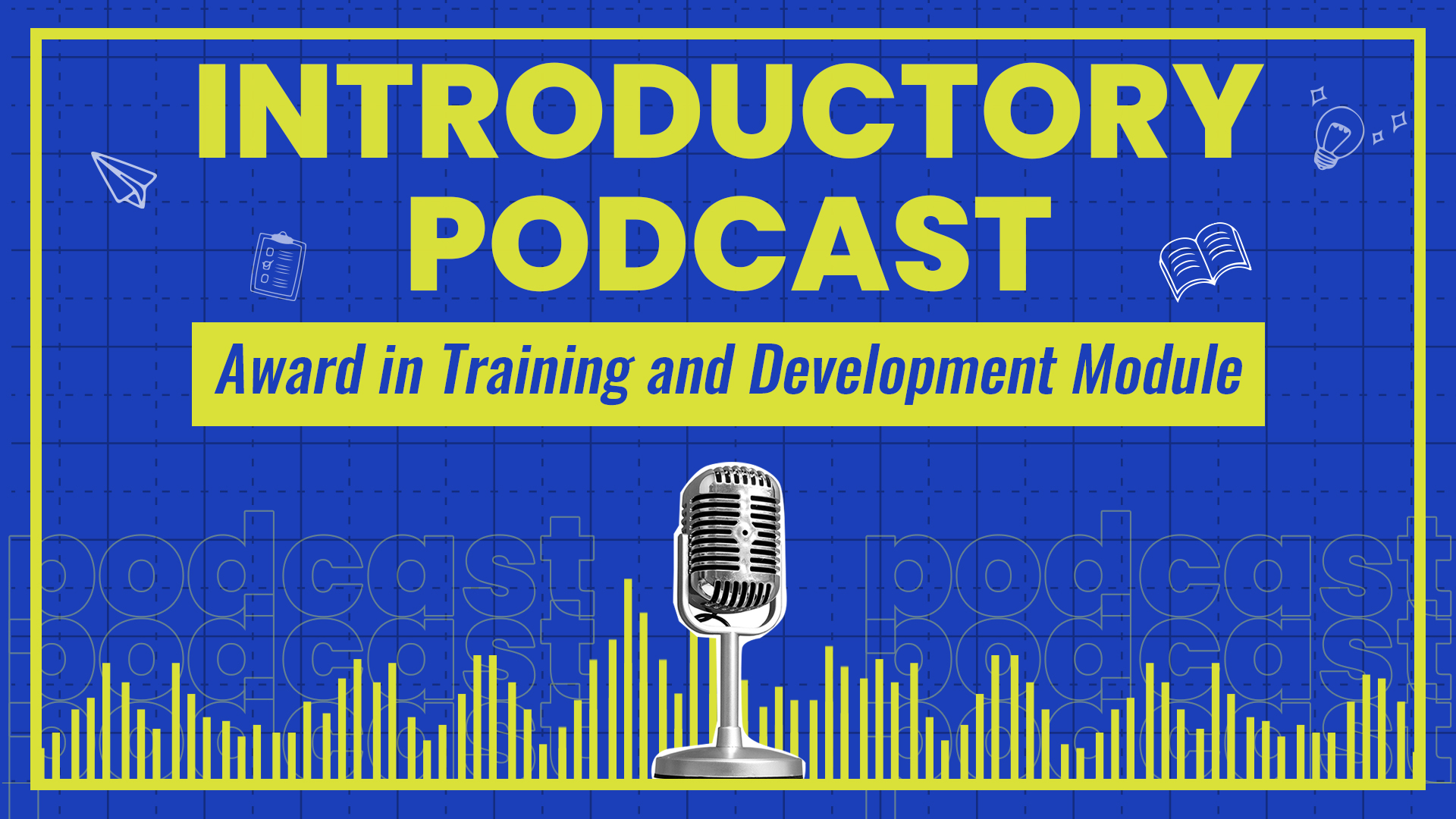Award in Training and Development
This module is designed to provide students with a comprehensive understanding of the theories, practices and strategies associated with learning and development processes at work.
-
OrientationDirector’s Introduction03:27Orientation10:52Understanding Podcasts01:46Understanding Pre-recorded Lectures02:25Understanding Pre-recorded Interviews01:54Understanding Case Studies01:47Understanding Discussion Boards02:30Ascencia Style SheetAI PolicyPolicy for Online Interaction and Behaviour for E-Academic Students
-
Coursework: Training and DevelopmentIntroductory Podcast04:54Assignment Podcast04:28
-
Topic 1: Introduction and the Strategic Role of Training and DevelopmentIntroduction and the Strategic Role of Training and Development47:02Introduction to the Strategic Role of Learning and DevelopmentPodcast Voiceover for Worksheet 01: Creating a Learning Culture00:04:13Podium Talk 1.1: How External Factors Shape Training Strategies00:08:00Podium Talk 1.2: Training Budgets00:10:52Podium Lecture: Foundations of Workplace Learning: Theories and Instructional Design00:54:09Resource 1: Cultivating a Culture of Learning at Microsoft with Viva LearningResource 2: How Microsoft Built a Learning CultureResource 3: How Pixar Designed a Culture of Collective CreativityResource 4: Pixar Great People Great IdeasResource 5: Airbnb Organizational CultureResource 6: The Power of Shared Experience How Airbnb Celebrates Diversity Through Multicultural TrainingResource 7: Want Success Like Google Approach Learning Like Google DoesResource 8: Training and Development at Google An In-Depth AnalysisResource 9: Excerpt from Education for the Age of AI
-
Topic 2: Learning Theories and Adult Learning Principles in Professional GrowthLecture: Part 1: Learning Theories and Adult Learning Principles in Professional Growth00:41:32Lecture: Part 2: Learning Theories and Adult Learning Principles in Professional Growth00:45:22Learning Theories and Adult Learning PrinciplesPodium Talk 2.1: Bringing Play Into L&D00:07:04Resource 1: The Impact of Andragogy on Learning Satisfaction of Graduate StudentsResource 2: The science of education using learning theory to solve teaching problems in medical educationResource 3: Adult learning theories Implications for learning and teaching in medical education AMEE Guide No. 83
-
Topic 3: Training Needs Analysis: Identifying Development Needs in a Business ContextPart 1: Training Needs Analysis34:37Part 2: Training Needs Analysis39:37Part 3: Training Needs Analysis32:33Training Needs AnalysisGuest Interview: Aimee Vella Bonnici00:38:59Podium Talk 3.1: Prioritising Training Needs00:08:07Resource 1: The effectiveness of training needs analysis and its relation to employee efficiencyResource 2: The ABC Guide to Training Need AssessmentResource 3: Training Needs Assessment Concept, Methods and ProcessResource 4: Training Needs Assessment Basis for the Development of Training Programs for Employees in a Public Higher InstitutionResource 5: Training Needs Assessment Tool Utilization and Global ImpactResource 6: Cogent Social Sciences
-
Topic 4: Designing Effective Training ProgramsPart 1: Designing Effective Training Programs54:29Part 2: Designing Effective Training Programs53:23Podium Lecture: Training Programs in the Public Sector00:50:36Lecture: Non-Verbal Skills for Presentations00:59:11Journal Article: Shark Tank: The Influence of the Use of Rhetoric and Non- Verbal Communication on Investment OutcomeNon-Verbal Skills for PresentationsPodium Talk 4.1: Gamifying Mandatory Training00:07:16Podium Talk 4.2: Designing the Right Training Environment00:06:51Podium Talk 4.3: Designing Effective Presentations00:09:40Topic 4.1: Be Proficient in the Use of Microsoft Office Tools01:30:39Lecture: Part 1: Translation and Language Services01:21:27Lecture: Part 2: Translation and Language Services01:05:37Recorded Interview with Kim Spiteri00:37:42Designing Effective Training ProgramsResource 1: Designing Effective Training ProgramsResource 2: Designing Effective Training ProgramsResource 3: Designing Effective Training ProgramsResource 4: Designing Effective Training Programs
-
Topic 5: Training Delivery MethodsPart 1: Training Delivery Methods56:37Part 2: Training Delivery Methods01:01:50Podcast Voiceover for Worksheet 01: Reflecting on Training Delivery Methods00:03:42Podcast Voiceover for Worksheet 02: Designing a Mini-Training Session with Online Tools00:03:58Training Delivery MethodsPodium Lecture: Soft Skills Development and Emotional Intelligence Training00:51:43Lecture: Part 1: Mastering Presentation Skills Training01:25:46Lecture: Part 2: Mastering Presentation Skills Training00:42:31Mastering Presentation Skills TrainingPodium Talk 5.1: Train the Trainer00:04:42Podium Talk 5.2: How HRIS Can Support Learning Initiatives00:04:40Lecture: HRIS00:26:03Digital Component – HRIS - Take From the Public Speaking ModuleFamiliarity With Learning Management Systems Such as TalentLMS & iSpring Learn01:04:49Podium Talk 5.3: Using Tools to Boost Engagement00:08:42Lecture: Audiovisual Equipment00:33:51Post-Lecture Podcast: Audiovisual Equipment00:03:13Tools for Enhancing PresentationsLecture: PPT (PowerPoint)00:17:28Lecture: CANVA00:11:10Post-Lecture Podcast: PPT & Canva00:04:02Effectively Use Software for Preparing Visual Aids for Presentations Such as Microsoft PowerPoint and Canva.Lecture: Overcoming the Fear of Public Speaking00:40:45Post-Lecture Podcast: Overcoming the Fear of Public Speaking00:04:39Overcoming the Fear of Public SpeakingLecture: Audience Analysis for Public Speaking and Presentation Skills00:36:14Audience Analysis in Public SpeakingLecture: Interacting with Small Audiences vs. Large Audiences00:52:45Interacting with Small Audiences vs. Large AudiencesLecture: Handling Audience Responses01:07:27Handling Audience Responses, Lack of Responses, Feedback, and QuestionsResource 1: Design and Assessment for Hybrid Courses Insights and OverviewsResource 2: Training Delivery Methods as Source of Dynamic Capabilities: The Case of Sports’ OrganisationsResource 3: Training Delivery Methods Implemented by American Companies Opportunities and Challenges in Context of Knowledge SocietyResource 4: Analyzing Employee Training Methods for Effective Adoption of Lean Six SigmaResource 5: Analyzing Employee Training Methods for Effective Adoption of Lean Six SigmaResource 6: Analyzing Employee Training Methods for Effective Adoption of Lean Six Sigma
-
Topic 6: Evaluating Training ProgramsPart 1: Evaluating Training Programs00:58:47Part 2: Evaluating Training Programs00:50:46Part 3: Evaluating Training Programs00:58:04Evaluating Training ProgramsPodium Talk 6.1: What to Do When Training Misses the Objective00:07:55Topic 6.1: Have an Understanding of HR Programs Such as BambooHR and Shireburn00:57:40Podcast Voiceover for Worksheet 01: Stakeholder Expectations00:04:02Resource 1: A Critical Review on Training Evaluation Models: A Search for Future Agenda. Journal of Cognitive Sciences and Human Development.Resource 2: Theory of Training Effectiveness Evaluation by Kirkpatrick Background of Theory.Resource 3: Implementing Cancer Pain Management Training for Pharmacists Using the Kirkpatrick Evaluation Model. Journal of Pain Research.Resource 4: Evaluating the Effectiveness of Existing In-service Training Courses on Infection Prevention and Control in Nurses: An Evaluation Using the Kirkpatrick Model. Shiraz E-Medical Journal.
-
Topic 7: Talent Management and Succession PlanningLecture: Part 1: Talent Management and Succession Planning01:09:44Lecture: Part 2: Talent Management and Succession Planning00:57:27Talent Management and Succession PlanningPodcast Voiceover for Worksheet 01: May’s Leadership Development Plan00:03:55Podcast Voiceover for Worksheet 02: Using the 9-Box Grid for Talent Mapping00:04:35Guest Interview: Zenah Hemedan00:37:59Resource 1: Review of History Succession Planning: Replacement Planning, Talent Management and Workforce PlanningResource 2: Succession Planning Best Practices for Large and Small Organizations
-
Topic 8: Performance Management & DevelopmentPart 1: Performance Management and Development01:24:56Part 2: Performance Management and Development00:52:01Lecture: Difficult Conversations with Underperformers01:21:36Legal Side of Training and Development00:42:13MCQPodcast Voiceover for Worksheet 01: SMART Goals Reflection00:03:48Podium Talk 8.1: Psychometric Testing in Learning and Development00:08:37Resource 1: Performance Improvement Plan in Building Process According to Quality Leaders and Quality Improvement Tools and TechniquesResource 2: The Language of Gender Bias in Performance Reviews.
-
Topic 9: Cross Cultural Challenges in Training and DevelopmentPart 1: Cross Cultural Challenges in Training and Development00:56:03Part 2: Cross Cultural Challenges in Training and Development00:33:41Cross Cultural ConsiderationsGuest Interview: Claire00:37:44Resource 1: Cross-Cultural Training and Adjustment Through the Lens of Cultural Intelligence and Type of ExpatriatesResource 2: Effective Training for International Cross-Cultural Collaboration and Leadership
-
Topic 10: Change ManagementChange Management01:27:52Podium Talk 10.1: The Impact of Organisational Change on Learning Programmes00:08:38Podium Lecture: Future of Learning and Development: E-Learning and Technology Trends00:57:00MCQ: Change ManagementResource 1: Implementing Lewin's Change Theory for Institutional Improvements: A Vietnamese Case StudyResource 2: The Change Formula: Myth, Legend, or Lore?
-
Topic 11: Coaching and Mentoring for Leadership and DevelopmentTopic 11: Coaching and Mentoring for Leadership and Development01:26:18Guest Interview: Part 1: Margaret Buhagiar00:21:17Guest Interview: Part 2: Margaret Buhagiar00:23:02Guest Interview: Karen Gill00:28:44
This module is designed to provide students with a comprehensive understanding of the theories, practices and strategies associated with learning and development processes at work. The module focuses on the strategic importance of learning and development to organisational success (how learning and development can help an organisation achieve its goals). Topics covered will include adult learning theory, instructional design, evaluation and assessment, and technology-based training. By the end of the module, students will have the knowledge and skills needed to design, deliver and evaluate training programs in a variety of workplace settings.
Programme Outcomes
- Systematically implement effective training and development strategies and initiatives that align with organisational goals and values
- Lead and motivate a team of trainers and other training professionals to meet an organisation’s training and development needs
- Establish and promote a culture of continuous learning, development and growth within organisations
- MQF/EQF Level 6 qualification. However, students’ circumstances and experiences may also be considered during the application process—five years of relevant working experience in the industry of specialization.
- Proof of B2 level of English – IELTS level/grade 6 or the student’s country equivalent.
- A Bachelor’s degree or graduate degree in humanities, sciences, human resources, organisational behaviour, business, administration, management, communication, journalism, psychology, arts or a related field.
- Minimum 180 ECTS at MQF/EQF Level 6 previously acquired at a Higher Education institution.
- Outstanding written and oral communication skills.
- A minimum of one year of work experience in a business environment will be considered as an asset.
Course Syllabus Podcast
Gain a Comprehensive Understanding of the Course Syllabus with Our Informative Podcast.
- Multiple choice assessment - 25%
- Individual assignment - 35%
- Survey - 40%
- E-portfolio
- You can submit your assessment at any time during the course.
What’s included
-
Duration :Full Time - 3 Months
Part Time - 6 Months - Learning: 250 +Hours
- Certificate

